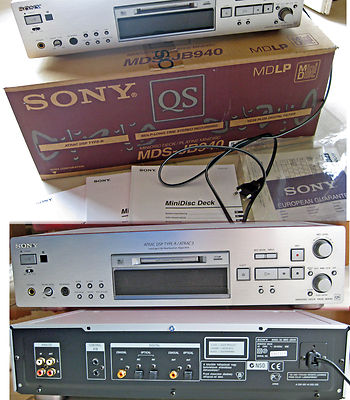Sony MDS-JB 940
Brand: Sony
General
- Model: MDS-JB 940 QS
- Color: black and silver
- Remote control: yes
- Dimensions (W × H × D): 430 mm × 111 mm × 286 mm
- Weight: 5.3 kg
- Voltage 230 V, 50/60 Hz
- Made in: Japan
- Sold from: 2000 to approx. 2002
- Original price: approx. 1000 DM / 500 Euro
Connections
- Inputs: 6
- Analog in (Cinch)
- Digital optical in 1 (optical input, Toslink)
- Digital optical in 2 (optical input, Toslink)
- Digital coaxial in (Cinch)
PS/2 socket for connecting a keyboard
- Sony system socket Control A1
- Outputs: 5
- Analog out (Cinch)
- Digital optical Out (optical output, Toslink)
- Digital coaxial out (Cinch)
- Headphones (stereo jack)
- Sony system socket Control A1
Technical data
- ATRAC DSP Type-R / ATRAC 3 (newly developed compression system, not comparable with the earlier designations of the ATRAC system) - data reduction, allowing more memory = more titles on one MD
- Power consumption: 18 W
- Error correction: ACIRC
- Sampling frequency: 44.1 kHz
- Frequency response: 5-20,000 Hz
- Signal to noise ratio: >100 dB
- Modulation system EFM
- Long Time Stereo Recording (LP2 and LP4)
- VC24 Plus Digital Filter
Special features
- MDLP: Longplay / stereo/ mono recording/ playback (doubling of recording time in stereo on LP2 (quality disputed), quadrupling on LP4 with moderate quality)
- For text input - connection of a PC keyboard possible
- Front panel made of aluminium, the silver model has a polished finish
- Sony QS series - Upscale and more expensive series (upper class and top class segment)
- Digital volume control of the headphones through the remote control
- Fading for recording and playback possible (remote control)
- Device can split, join, move, delete tracks
- Undo function (rescue deleted recordings)
- Music synchronization possible (Sony CD player)
- Timer preparation
Remarks
- Other models of the same series:
- Previous model: Sony MDS-JB 930
- Successor model: Sony MDS-JB 980
- Remote control: Sony RM-D49M
- Device can record/play in conventional ATRAC and in ATRAC 3. The new ATRAC 3 system also had disadvantages: older MD decks cannot play ATRAC 3 recordings (see Stereoplay 12/2000 p. 156f, where the whole principle is explained).
Pictures
Test reports
- STEREO 11/2000: Sound quality 76 %, 3rd place in the list, price-performance 3 stars (very good). "The reason recorder for demanding: audiophile sound image with digital copies, lovingly processed." (Stereo Testspiegel)
- STEREOPLAY 12/2000: Sound top class, 40 points - Stereoplay test verdict: outstanding
Links
